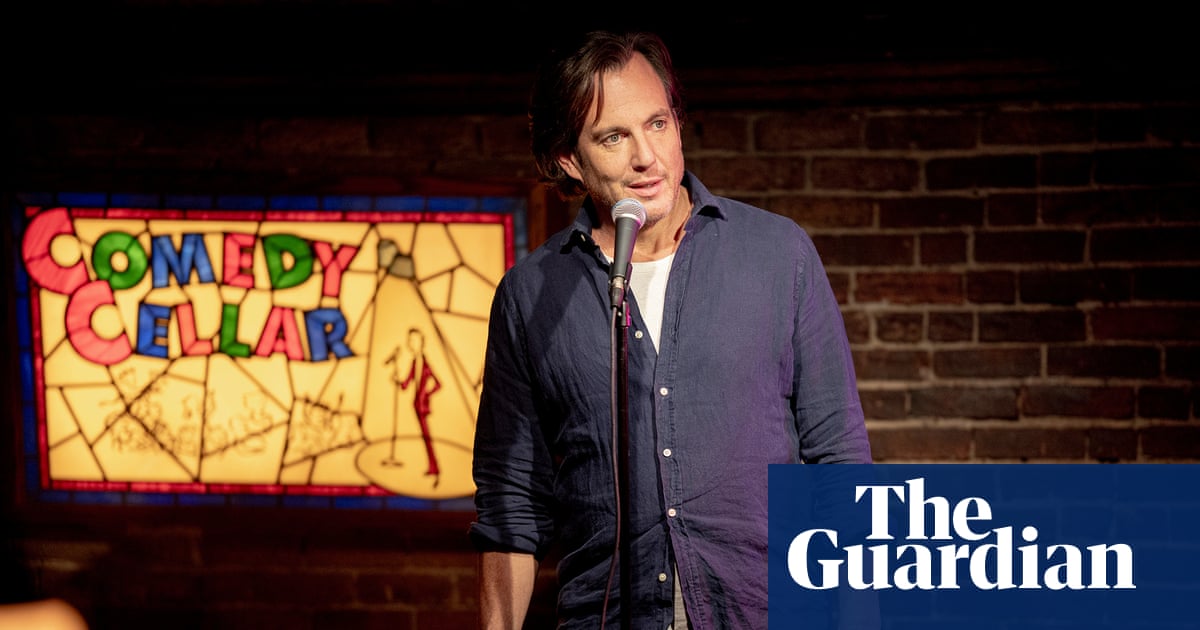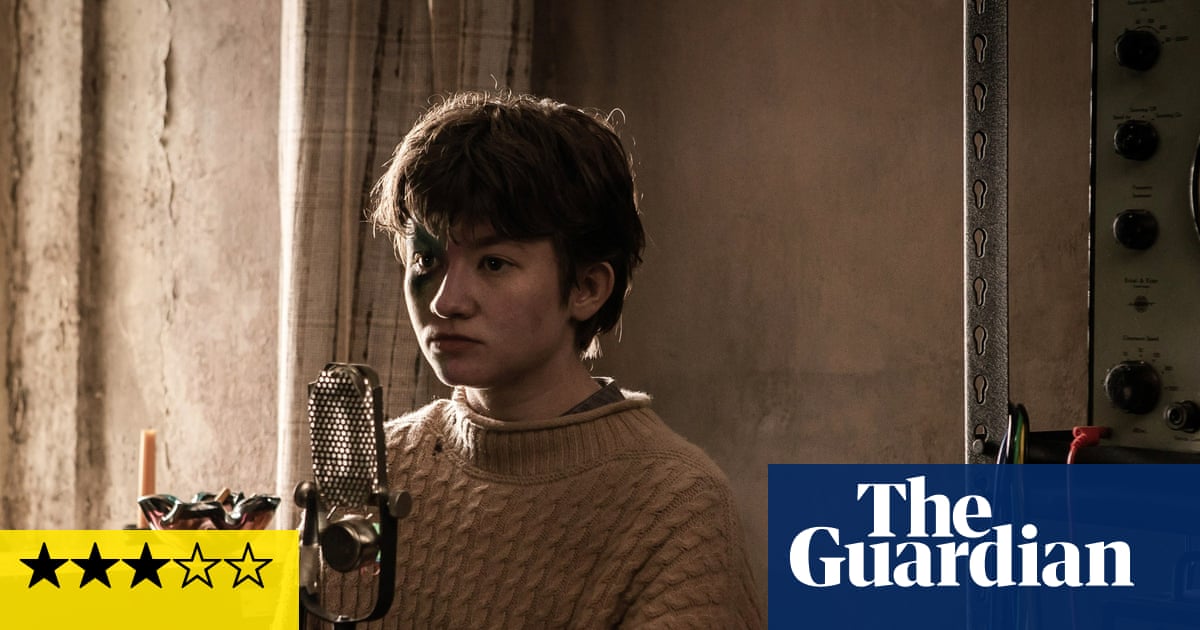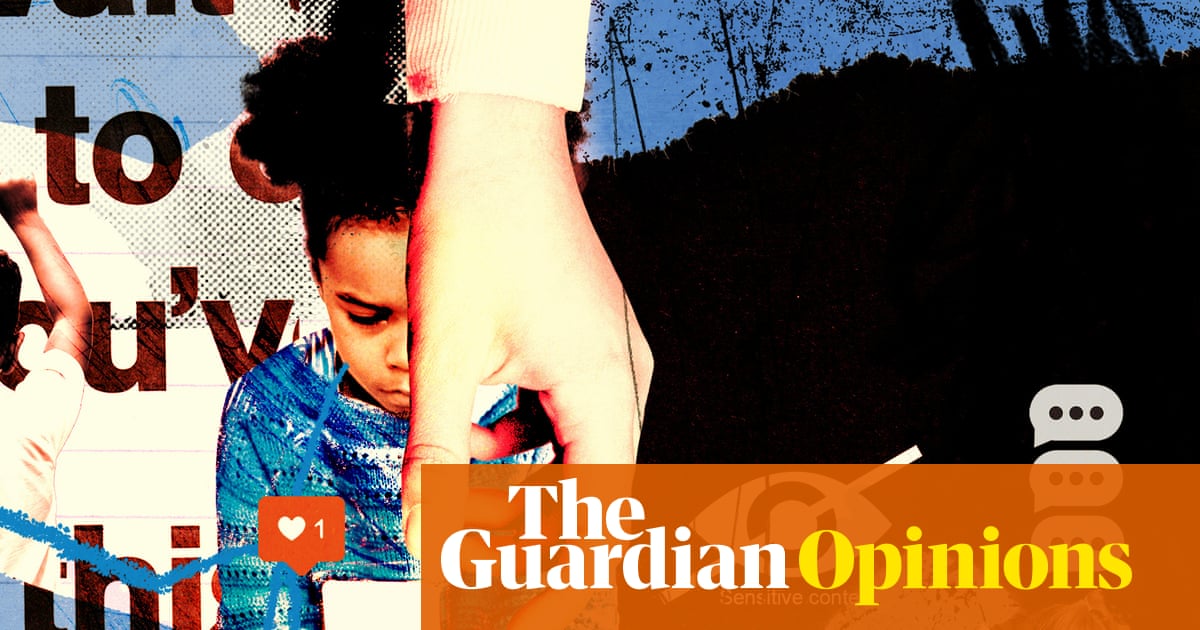
History
James I’s beloved bedfellow
The Scapegoat
Lucy Hughes-Hallett
The Scapegoat Lucy Hughes-Hallett
James I’s beloved bedfellow
Being king can be a lonely business. Perhaps the less suited a person is to rule, the more urgently they feel the need for a companion, a favourite, who will ease their worries and provide their pleasures. James I of England was just such a monarch. Although he had an unshakeable faith in his right to rule, he required distraction from the heavy burden of state. Scholarship, including musing on the divine right of kings, was one of these escape routes; hunting and drunkenness, too; but his true solace, for nearly 10 years, was his beloved bedfellow, George Villiers, whom he raised from humble origins to become Duke of Buckingham.
Buckingham has been relatively overlooked because his identity-bending role as James’s “sweet child and wife” rendered him somehow suspect. A man whose skills included dancing like a dream and looking marvellous on a horse was seen as less worthy of study than a minister of state, despite the decade-long role Buckingham would grow into as co-architect and implementer of Stuart policy. The fact that the issues that would tear the country apart when the civil wars began 14 years later had their roots in these policies only adds to his importance. This fabulous biography is long overdue.
Historians need anthropological as well as psychological skills, and these Hughes-Hallett possesses in abundance, along with an easy, wry wit. Guiding us through Buckingham’s “entrancingly strange” netherworld, she strikes a delicate balance between exploring the attitudes of 17th-century society and keeping her feet firmly in the present day.
Lucy Moore

Fiction
Ingenious cosy crime spoof
The Proof of My Innocence
Jonathan Coe
The Proof of My Innocence Jonathan Coe
Ingenious cosy crime spoof


Well, it worked for Richard Osman. Twenty-three-year-old Phyl, stuck in her parents’ house with an English degree and a zero-hours job in a sushi chain, is wondering how hard it could be to write a cosy crime novel. “Death in a Thatched Cottage? The Beach Hut Murders? The Flapjack Poisonings?” As another character points out, it’s bizarre that violent homicide has been rebranded as “cosy”. “It’s very British, in some indefinable way.”
Jonathan Coe, the laureate of Britishness, sets his 15th novel against a particularly wobbly period of national history: the short-lived ascendancy of Liz Truss and the death of the Queen in autumn 2022. It is indeed a happily playful and nicely satisfying slice of cosy crime, scattered with clues and red herrings, locked‑room mysteries, teetering cliffhangers and stagily withheld information.
There’s a lot going on, and Coe marshals it all with ingenious ease. As ever, the real target – the savagery behind the cosiness – is the amoral individualism and free-market greed of those with power and privilege, first excoriated in 1994’s What a Carve Up! Here, rightwingers gather at a country house hotel for the TrueCon conference, delighting in the elevation of Truss and Kwasi Kwarteng. Alongside the culture war comedy of speeches such as “Britain’s Real Pandemic: The Woke Mind-Virus” is the serious business: big money jostling to get in on the carving up of the NHS.
Coe enjoys himself satirising literary fashions, creative jealousy and the inevitable passing of time, with a bittersweet nostalgia for his own youth, when society was seduced by money, and the books world by Martin Amis’s Money. He gives himself a walk-on part in the Cambridge section as Tommy Cope, an ineffectual English student mainly known for writing incredibly bad poetry who later surprises his peers by achieving “modest success” with the “mildly satirical” Quite the Mash-Up.
Coe’s subject may be inertia and nostalgia, but The Proof of My Innocence is full of energy. It’s a madcap caper, a sideways memoir, a tricksy jeu d’esprit that is also a quiet defence of fiction in a post-truth age, and enormous fun to read.
Justine Jordan

Fiction
Humanity’s future
Under the Eye of the Big Bird
Hiromi Kawakami
Under the Eye of the Big Bird Hiromi Kawakami
Humanity’s future
In Keepsakes, the opening section of Hiromi Kawakami’s haunting novel-in-stories, a woman describes her world. Although peaceful and orderly, it is an unsettling and strange place: people are made in factories from animal DNA, then live startlingly brief lives, growing to adulthood in a handful of years and often dying young. Memory, both personal and historical, is fragmentary and, in the case of memories of childhood, actively suppressed. Meanwhile, the society’s anxieties are focused on preserving the children the woman helps raise and the biological diversity they embody: as one of the characters declares, “If we lose the children, that’s the end of the world”.
This spectre of genetic decline and extinction stalks all 14 of the stories that make up Under the Eye of the Big Bird. In one, men – now vanishingly rare due to their genetic fragility – are assigned to breed with particular women; although they “marry” them, the question of consent is never invoked. In another, one of the characters reflects that, “as a species, we simply don’t have what it takes”.
Despite this thread the connection between the different stories is not clear at first. Instead, as they shift between characters and timeframes, each section seems to offer a glimpse of a new and newly nightmarish future. Gradually, however, a larger story begins to emerge. After a long period of falling population due to declining fertility, a last-ditch attempt has been made to save humanity by dividing us into separate communities, each under the supervision of “watchers”, raised and trained by AIs known as mothers. Within these communities “all reproductive taboos would be lifted” in the hope of jumpstarting human evolution by provoking “mutations on a far shorter timescale than in any previous evolutionary process”.
In its final stages, Under the Eye of the Big Bird bends back on itself, suggesting that this far-flung future may also be the past, or at least that the ending it conjures may in fact be a new beginning. As it does so it offers a powerful corrective to the assumption of human primacy, instead reminding us that we are not the endpoint in the process of evolution, but simply one link in a much longer chain.
James Bradley

Science
The great biologist’s swansong
The Genetic Book of the Dead
Richard Dawkins
The Genetic Book of the Dead Richard Dawkins
The great biologist’s swansong
The “dead” of this book’s title refers not to our long departed ancestors, whose ancient DNA scientists like me now scrutinise. Instead, it’s a metaphor for genes as artefacts of past organisms and their environments. As ever, Dawkins shines his light on the gene-centric view of evolution – it is not the individual, the population or even species that are the subject of selection, but these units of inheritance composed of DNA. He showcases the effects of nature’s genetic choices in mimicry, camouflage, predation, mating – all areas that have been very well covered elsewhere (not least by Dawkins himself). He does do it well, albeit with the tone of a Victorian gentleman naturalist. All life is in these pages, and by all, I mean almost exclusively cute animals, which make up a vanishingly tiny proportion of life on Earth, but have given us so many of the vital clues to the puzzle of evolution. Bower birds, horned lizards, naked mole rats, cuckoos, mossy frogs, owls and Tasmanian tigers and bears, oh my!
This is a wonderful book in so many ways, but I didn’t love it, I think because my tastes in prose have evolved. It feels like the last instalment from a bygone era of grandiloquent science writing, one of which Dawkins was the doyen, the raconteur. It’s a greatest hits, or Dawkins by numbers, depending on your point of view.
Adam Rutherford

Fiction
A thrilling coda to an otherworldly trilogy
Absolution
Jeff VanderMeer
Absolution Jeff VanderMeer
A thrilling coda to an otherworldly trilogy
Ten years ago, Jeff VanderMeer published the three volumes of the Southern Reach trilogy, which between them charted the incursion of the otherworldly into a stretch of Florida coastland. In Annihilation, scientists venture into what has been dubbed “Area X” and quickly find themselves physically and psychologically transformed. Authority follows a middle manager who, in the wake of this mission’s failure, is dispatched by the shady “Central” to evaluate the people who have made studying Area X their life’s work. Acceptance jumps between timelines: the days preceding Area X’s creation, the weeks preceding the departure of the mission in Annihilation, and the aftermath of Authority, in which Area X breaks its bounds and seems set to transform the world.
Absolution, the unlooked-for follow-up to the trilogy, seems at first glance like a series of outtakes from it, featuring familiar names and previously unknown backstory. Twenty years before the event that triggers Area X’s emergence, a scientific expedition – secretly bankrolled by Central – encounters harbingers of weirdness, such as the appearance of thousands of cannibalistic rabbits, and a mysterious figure dubbed the Rogue. And then 18 months before the event, a disgraced Central agent known as Old Jim is dispatched to the region to investigate the expedition’s failure and find the Rogue. A year after the event, that first expedition into the site is related to us in the drug-addled, profanity-laden voice of one Lowry, whom readers of Annihilation will recognise as the expedition’s sole survivor.
Much of what made the original Southern Reach books powerful and disturbing can be found in this new volume. There is, however, a shift in Absolution’s focus, one that perhaps reflects the intervening decade of real-world events. The original Southern Reach books often featured grey bureaucrats attempting to quantify the indescribable. Absolution turns its attention to these bureaucrats, in the process revealing that they are not so grey. Central may in fact be a greater danger than Area X.
Readers looking for a solution to Area X’s mysteries in Absolution will come away puzzled. The novel adds new information to our understanding of the site and its genesis, but also opens new questions, and leaves some dangling loose ends. What it does do is reinforce the original series’ contention – that the boundary between the uncanny and the familiar is more porous than we realise.
Abigail Nussbaum

Politics
The Watergate veteran on Gaza, Ukraine and Trump
War
Bob Woodward
War Bob Woodward
The Watergate veteran on Gaza, Ukraine and Trump
Bob Woodward is probably the best-known journalist in the world. He built his reputation on Watergate, of course, and just about everything he and Carl Bernstein wrote about it turned out to be entirely accurate: including the existence of Deep Throat, who was sometimes thought to be a “Woodstein” invention, but was much later revealed to be a top FBI official. If you talk to Woodward on deep background, he won’t break trust with you and leak your name; so hundreds of senior officials and politicians over the years have had the confidence to speak to him on condition of anonymity. In War, as in every other one of Woodward’s 22 books (this one billed as a “behind-the-scenes story of three wars – Ukraine, the Middle East and the struggle for the American Presidency”), you can have total faith in the accuracy of every quotation he provides.
However, the problem with the book is that it simply reinforces everything we already know about Ukraine, Gaza, and the presidential campaign. I read War, which like all Woodward’s work is well-written, even a page-turner, without coming across a single thing that was a genuine surprise. We don’t need Woodward to tell us that the CIA and MI6 had complete knowledge of Putin’s plans for the invasion of Ukraine, because the two intelligence agencies made it absolutely plain at the time.
Still, the fundamental verdict of War is a powerful one. Trump is “the wrong man for the country” and is unfit to lead it, Woodward says, magisterially. (In return, Trump calls Woodward a liar, and his spokesman has implausibly denied that most of the quotes in the book were genuine.) Yet here again there’s a problem. Woodward is no longer the impartial recipient of the confidences of hundreds of well-placed people across the spectrum; he has got his own strong views, and he wants to convince us they’re correct. The fly on the Oval Office wall has fluttered down and joined in the argument. Where does Woodward’s long, masterful, often mesmerising series of Washington insider books go after this?
John Simpson

Fiction
A daringly old-fashioned novella
The Party
Tessa Hadley
The Party Tessa Hadley
A daringly old-fashioned novella
Tessa Hadley’s novella has an alluring opening line: “The party was in full swing.” Evelyn is following her glamorous older sister Moira to an ostentatiously unglamorous gathering in a docklands pub in postwar Bristol, where there’s “sawdust on the stone-flagged floor” and smoke-stained plaster walls “crowded with advertising for brands of beer and rum and tobacco which hadn’t existed for decades”. Hadley, usually a writer of bourgeois households, strong on gardens and antique furniture, has a good time with dereliction, adding memorably to the literature of urination when the sisters can’t find a loo. Evelyn has just started a BA in French and is working with sweet self-consciousness on her transformation into adulthood, hyper-aware of her clothes and manners and vocabulary in the way of a young adult changing class. Moira, studying fashion design at art school, seems – at least to Evelyn – more confident, more experienced, less interested in changing status.
Evelyn meets people she knows at the party, her sister’s colourful friends and a smart and kind fellow student, Donald, whose niceness makes him unattractive to her but not to the reader. She asks him to buy her a drink to alleviate her disappointment with the evening: “I’m not talking to anybody,” she says to him, “or at least not anybody I actually like.” When he obliges, she abandons him: “she submerged herself effectively in the flamboyant, quarrelsome, ecstatic, flirting mass, drifting between different groups as if she were always on her way somewhere else”. Poor Donald. This is not a world in which a woman can buy her own drink.
In some ways this is daringly old-fashioned writing, its forms as retrospective as the bombed city and prewar furniture. There’s an omniscient narrator, no trendy close-third here, and, as the quotations suggest, no coyness about adjectives. This novella isn’t a parable or a political fiction, as many recent short novels have been. It’s a pen portrait of a particular family in a particular time and place, quick and bright despite – or maybe, oddly, because of – the magnificently Victorian tendencies of the prose.
Sarah Moss

Memoir
From fish out of water to Hollywood star
Sonny Boy
Al Pacino
Sonny Boy Al Pacino
From fish out of water to Hollywood star


Al Pacino, whose nickname “Sonny Boy” comes from the Al Jolson song of that title, begins this fine memoir in 1943 when he is three and his mother, Rose, a pretty, sensitive factory worker, starts smuggling him into the local picture house. Together they drink in the stories unspooling from the silver screen, doubly delicious since their own lives are so bleak. Rose’s impossibly handsome boy-husband has already skedaddled to another marriage and Rose has taken little Alfredo back to the South Bronx to live with her parents. Sonny delights in the role of provider and protector, buying his mother Kotex from the drugstore and shouting at the construction workers who dare to leer.
Pacino’s account of New York’s postwar mean streets is startlingly cinematic. He introduces us to his gang of little toughs, kids called Cliffy, Bruce and Petey who bunk off school to play in the derelict allotments or fish in open sewers for anything shiny that they can sell for a dime. They can’t afford to join the Scouts so they beat up the kids who can – the lucky ones with two sober parents and a dad who has a job. It is, says Pacino, only thanks to Rose’s care and attention that he doesn’t end up the same way as his friends, all dead by 30 from being “on the needle”. With her encouragement and his own penchant for declaiming Ray Milland’s speeches from The Lost Weekend around their tenement apartment, Sonny gets a place at New York’s High School of Performing Arts.
He is both a fish out of water and an absolute star. When, after a particularly good performance, someone says “Hey kid, you’re the next Marlon Brando,” he doesn’t know who they are talking about. What the reader is waiting for, of course, is the moment in 1972 when Francis Ford Coppola plucks him out of the ranks to co-star in The Godfather. The studio had wanted Jack Nicholson but when Pacino learns that his grandfather, Rose’s father, was born in a Sicilian town called Corleone, the whole thing begins to feel like fate.
Kathryn Hughes

Memoir
The magus speaks
Powsels and Thrums
Alan Garner
Powsels and Thrums Alan Garner
The magus speaks
Garner lives where generations of Garners have before him. The “powsels and thrums” of his weaver ancestors were fabric scraps, cutoffs, experiments, intriguing threads: a homely metaphor for this collection of poems, lectures, memoir fragments and essays. Certain notes recur from past work: tales of his grandfather, Joe Garner, who first told him the legend of the sleeping heroes of Alderley Edge, in Cheshire, and issued the gnomic advice: “If the other feller can do it, let him.” In other words, find the work that you, and only you, can do. We see again how Garner, living by the Jodrell Bank telescope, is both rooted in the land and gazing at the stars: the brief poem Nova just as cosmic as his astounding novel Red Shift. The little contains universes.
This rich collection underlines the homogeneity of his life’s work: how themes and processes jostle against each other again and again – deep history, ancestry, cosmology, archaeology, anthropology, myth and legend.
Garnerworld might be a narrow plot, but he’s dug it deep, in every sense. In The Carr he records hard graft to tame his land – the hewing of a vicious alder in boggy ground that threatens to swallow him up – in language as precise as it is poetic. Elsewhere, the neolithic hand axe he finds (his house is built on a barrow) sends him looking up to the stars again, at light reaching him from before the stone was shaped.
The Bull on the Tongue is a vital reflection on creativity in which Garner puts forward a counterintuitive but persuasive argument on the constraints of imaginative writing. “The visionary-based mind can’t be as prolific as the observational,” he argues. Conveying the nebulous, the liminal, that which lurks behind the veil of everyday life, entails discretion, and demands that the writer trust that readers can follow wild, intuitive leaps. Old Men’s Trousers and The Making Strange of Things races from Russian interpreters, the difference between creole and pidgin and the peculiarities of the Basque language, to Garner’s magnificent dismissal of academic approaches to his work: “philately may be the harmless affair of consenting philatelists, but it is not the concern of the postman”.
Suzi Feay

Essays
The pen and the sword
Namesake
NS Nuseibeh
Namesake NS Nuseibeh
The pen and the sword
“Floating in painful limbo, I belong to no one,” writes British-Palestinian doctoral student NS Nuseibeh in her first book of essays. She uses memories, historical research and stories from early Islam to reflect on her identity and on what it means to be a Muslim feminist in these turbulent and sorrowful times. Born in East Jerusalem, Nuseibeh doesn’t fit cliched expectations of a Palestinian Muslim. She has light skin and an American accent, and studied the Qur’an at university, not in a mosque. In moments of doubt and insecurity, she searches for connection with her indomitable ancestor and namesake, Nusayba, a mythic warrior, mother and early convert who fought alongside the prophet Muhammad. Nusayba is an enthralling conduit into her family’s cultural heritage and “easy for me to imagine, as I sit curled up here on my bed, in a slightly cold room in Oxford, thirteen hundred or so years later: a stout, muscled woman atop a horse, licking sweat from her lips as she strings a bow one-handed”.
Searching and honest, these essays carry the reader from New York dinner parties to seventh-century battlefields to Jerusalem checkpoints and down the alleyways of a shrewd and compassionate mind. As she trails Nusayba, the academic in her recedes and you can hear a girlish heart racing, her belief in her own courage blossoming. This subtext is what makes Namesake a pleasure to read: the shy, people-pleasing scholar behind all that incisive research diving headfirst into old myths as if trying to resurrect her redoubtable foremother. Will she find belonging and a connection to her ancestors? Will she ever return to Gaza or get flagged by Prevent? Will she stop worrying, make peace with overstaying houseguests and English aubergines? Will she be allowed to introduce herself as Arab and feminist without having to reject her Muslim history? At once vulnerable and intellectually rigorous, here is an illuminating and trenchant exploration of Muslim feminism. An essential read in the war against lazy stereotypes, cultural annihilation and every form of apartheid.
Dina Nayeri

Short stories
Chilling tales for Halloween
The Hotel
Daisy Johnson
The Hotel Daisy Johnson
Chilling tales for Halloween
From the tricksy, unstable terrain of Fen, her debut collection, through the Booker-shortlisted Everything Under, to the darkly gothic drama of her 2020 novel Sisters, Daisy Johnson’s fiction has long bumped up against the edges of horror. She has deployed the tropes and played with the imagery, but always left the reader with a way out – the option to interpret her work as magical realism, or psychological drama. The Hotel is different. In this new book of short stories, she fully, deliciously commits to the genre, via a series of brief, chilling tales of ghosts and witches, monsters and manifestations; rooms that change shape and “footsteps close behind you but no one there when you turn”.
The connective tissue is The Hotel of the title: nameless throughout, but always capitalised; looming over every sentence in which it appears. The stories take us back through The Hotel’s history: its ill-starred construction; the people who are drawn to and undone by it; the semi-sentience that roils and twitches within its walls. In Johnson’s work, landscapes have always set the tone and powered the action, and The Hotel is no exception: the flat, wet land of the Fens dampens its walls and sucks at its foundations, refusing readers firm footing.
Sarah Crown

Biography
Rock's poet of the shadow self
Lou Reed: The King of New York
Will Hermes
Lou Reed: The King of New York Will Hermes
Rock's poet of the shadow self
“King of New York” was the epithet given to Lou Reed by David Bowie, an obsessive Velvet Underground fan who rescued Reed’s lacklustre solo career by producing Transformer, which spawned his biggest hit, Walk on the Wild Side. It’s also the title of Will Hermes’s meticulous yet vivid new biography, the first to draw on the archive donated to the New York Public Library by Reed’s widow Laurie Anderson. As in his 2011 book Love Goes to Buildings on Fire, about the city’s mid-70s musical landscape, Hermes expertly conjures the different scenes Reed inhabited, placing him amid a rich cast of collaborators, friends and lovers.
There’s a sense that he’s updating Reed for a new generation, particularly as a prophet of queer liberation and gender nonconformity. This isn’t a stretch: one of his best songs, 1969’s Candy Says, is an achingly poignant evocation of gender dysphoria, among other things. On 1972’s Make Up, three years after the Stonewall riots, he proclaimed “Now we’re coming out, out of our closets / Out on the streets”. From 1974 to 1977 his partner was the trans woman Rachel Humphreys, and there was nothing closeted about their relationship.
Hermes diligently recounts the creation of albums through the 80s, 90s and beyond, even as the cheques for use of his old songs in samples and ads started to roll in, making him a wealthy man. His greatest late-career release, New York, turned an unflinching eye on his hometown, railing against poverty and prejudice, mocking a hopeful poem about the statue of liberty: “Give me your hungry, your tired, your poor, I’ll piss on ’em.”
But if he made his name as rock’s poet of the shadow self, whether his own or society’s, it was in the service of a more truthful beauty. In his moving final chapter and epilogue, Hermes describes Reed’s final days in 2013 – his body had rejected a transplanted liver, and he knew he was dying. “I am so susceptible to beauty right now,” he said, as friends played him the Shangri-Las, Nina Simone, Frank Ocean and Radiohead while he floated in his heated pool. In reality, he always was.
David Shariatmadari

Fiction
Body horror with historical bite
Carrion Crow
Heather Parry
Carrion Crow Heather Parry
Body horror with historical bite
You don’t tend to encounter much body horror in historical fiction. We have our bold innovators, to be sure, but for many the archaic and the genteel remain oddly synonymous. The good news, if that’s you, is that there’s almost no swearing in Heather Parry’s new novel. The bad news is that it’s vile and unspeakable in almost every other way. But don’t let that put you off. Carrion Crow may be set in a fetid late Victorian London and couched in lightly brocaded prose, but what lurks within is unmistakably red in tooth and claw, a creature nearer in kinship to Kathy Acker than to Sarah Waters.
The body undergoing the horrors belongs, in this instance, to Marguerite Périgord, the daughter of a French noblewoman in reduced circumstances. When the wayward Marguerite attracts a suitor, a strenuously unromantic solicitor named Mr Lewis, Cécile Périgord isn’t taking any chances. In a show of aristocratic mettle, she imprisons Marguerite in the attic, there to acquire the complexion and manners her wifely vocation will require.
Deprived of any other agency, Marguerite tests the limits of her body’s mutability. Finding that her hairpins prick her as she sleeps, she eats and later expels them, “each one bringing a satisfied smile to Marguerite’s face as it tinged off the chamber pot”. By way of a wretched dirty protest, she then hammers the pins into the ceiling.
There is much worse to come as Marguerite sets about her self-destructive rampage. Shorn of all dignity, she brings about a martyrdom of debasement and self-harm. If it oozes, flakes or erupts from the human frame, it is almost certainly described here, and in glistening detail. Parry can write with an easy grace, but for the most part she denies herself the luxury. All Marguerite wants is “to feel adult and fecund”, but all she hears is that she is “not quite delicate enough”. Carrion Crow isn’t anyone’s idea of delicate, either, but it is richly fecund and adult in every sense of the word.
Paraic O’Donnell

 3 months ago
73
3 months ago
73

















































